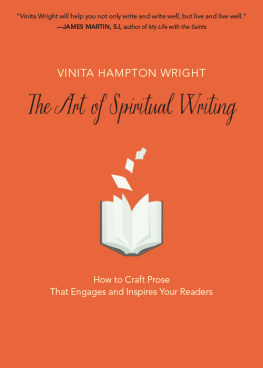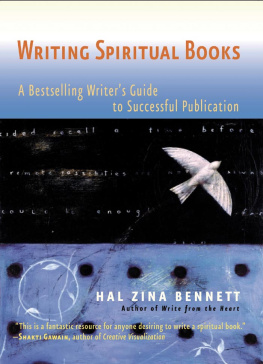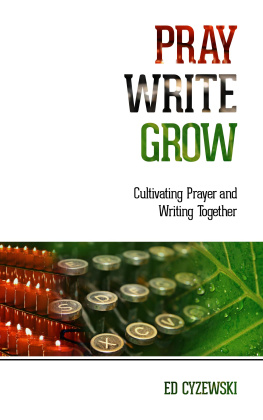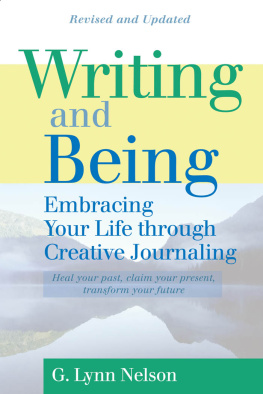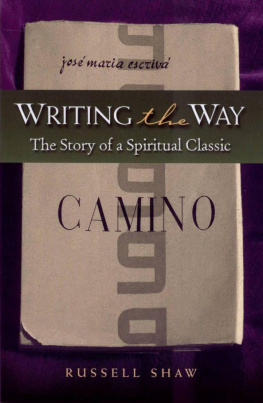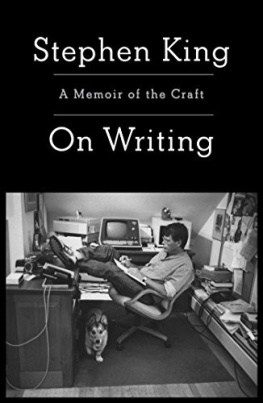
3441 N. Ashland Avenue
Chicago, Illinois 60657
(800) 621-1008
www.loyolapress.com
2013 Vinita Hampton Wright
All rights reserved.
Cover art credit: Simon Oxley/iStockPhoto.com/ThinkStock
eBook ISBN: 978-0-8294-3909-0
Based on the print edition: 978-0-8294-3908-3
Library of Congress Control Number: 2013943382
13 14 15 16 17 EPUB 5 4 3 2 1
First of all, you need to know that this book is a manual. For more than two decades I have advised writers and edited their work for the spirituality market. Now I have tried to distill the best of what I know for those writers who hope to serve peoples spiritual needs. You wont find stunning prose heremainly I provide lists and short paragraphs designed to instruct and help.
If you have spent many years reading books, you probably remember the day a mere paragraph changed your life. Perhaps you have experienced multiple conversions while at the mercy of words on a page. Good writing can do that. Spiritually astute writing has that kind of power.
You have picked up this particular book, an indication that you desire to write life-changing prose and, perhaps, publish it. You want to inspire, inform, challenge, or delight the person who takes in your phrases and stories. You hope to write paragraphs that set fire to readers souls, the kind of paragraphs that people underline and take to heart.
Such writing is deceptive because it takes hard work, but once that work is done, the sentences and phrases read as if they came naturally and without effort. Thats why we call writing a craftyou have to become good at it. If you dont become skilled at the craft, you simply wont reach the heart and mind of your reader. Instead, you will bore the reader and muddy the idea and get in the way of the writer-to-reader encounter that leads to inspiration and transformation.
Several years ago, I wrote another book, The Soul Tells a Story: Engaging Creativity with Spirituality in the Writing Life. That book explores the creative process in more depth, was written to inspire and encourage, and in places has a measured, contemplative feel. If you want to understand your creative process better and learn how to do the whole-life work of a writer, I suggest you first go to The Soul Tells a Story. I tell more stories in that book. Actually, I use a sweeter voice in that one, too.
If youre ready to get to the business of writing and publishing, however, keep reading.
A significant number of the suggestions in The Art of Spiritual Writing are given to help you make your writing more marketable. As an editor for a Jesuit publisher for the past decade, I have seen a good deal of writing cross my desk. My editor colleagues and I feel that many writers have important things to say but are not knowledgeable about what it takes to write for an audience beyond family and friends. These are the issues we deal with daily as manuscripts and proposals come to us. That lack of knowledge in potential authors is the primary reason we turn down manuscripts.
In The Art of Spiritual Writing, I try to help you get the job done. I presume that you are already inspired and have something to say; the goal is to help you say it effectively and get it published.
So, lets get to it.
Lets not worry too much over definitions, because spirituality is as diverse as the people who try to practice it, and writing manifests in almost as many styles. It is important, however, to identify the qualities that mark both fiction and nonfiction writing as spiritualas relevant to interior, intentional development. How shall we describe spiritual writing?
Spiritual writing is true.
It compels us to see the truth and worry over the truth and allow the truth to change us. Sometimes we must reassess what we have seen as truth and believed to be the truth. Sometimes we must see truth from anothers viewpoint, which will reframe truth that for years was familiar and comfortable and that required little from us.
Spiritual writing is courageous.
Otherwise it could never deal with the truth. Were spiritual writing not courageous, it would be impossible to do the hard work that makes the writing worthy of the label spiritual. Courage goes straight to the question and unease; courage allows confrontation and disassembling so that the new thing can be created. Courage also does not care much about prevailing opinions but writes what must be written.
Spiritual writing is hopeful.
A writer of spiritual work believes that life is worth writing about. He or she believes that reflection and exploration will reap benefits. The spiritual writer communicates for the sake of uplifting the world, celebrating it, opening its depths, revealing its wonders, and healing its wounds.
Spiritual writing is engaging.
Because my day job for more than a decade has been editing books for a Jesuit publisher, I have become well acquainted with the principles of Ignatian spirituality. The Jesuit order of Catholic priestsalso known as the Society of Jesuswas founded way back in 1539 by St. Ignatius of Loyola and several companions. Ignatiuss most well-known writing, The Spiritual Exercises, became foundational to what many of us know as spiritual direction. I could go on at length about Ignatiuss insights, but I mention him in this book because he understood that the spiritual life is an ongoing engagement with reality. He understood that prayer must always be an experience, not merely an idea or a belief.
As a writer and one who has assisted many other writers, I have learned that creativity also is bold engagement. Good spirituality writing creates an experience for the reader and makes demands on the reader, but only after it has done all of that to the writer. True creativity is a spiritual function, a form of engagement that requires openness, attentiveness, honesty, and desire. These same traits are necessary for spiritual growth and enlightenment. The best spiritual writing is what I would call thoroughly Ignatian in that it creates an experience for the reader. This sort of writing goes further than providing information or giving instructions; it creates a space of engagement in which the reader might connect to reality and be moved forward into her life and gifts.
So when you bring together the act of writing with the realm of spirituality, you have encountered engagement in one of its finest embodiments. Spirituality writing transcends words on the page, yet it forms through words. When a writer takes on the task of exploring the world of the spirit, she has invited a process that will change her permanently. If she has done her work well, it will change her readers, too.
How do we bring together our most interior sensitivities with the concrete experiences we create by arranging words into sentences, pages, and entire visions?
How do we tame the fiery truths of the universe by giving them names or descriptions? Should we even try?
I believe that, for some of us, attempting to juggle fire is a life calling. A writers task is to discover the names of things, and the task of a spirituality writer is to provide vocabulary by which the rest of us can name what Godthat lovely, terrifying Divineis doing to us, for us, around us, and right inside us.
What follows are a few chapters to help the writer who feels compelled to invite this quite spiritual process in which she lays out, in phrases and paragraphs, the realm where human meets Divine, where we truly engage and then tell the story of what happened.

